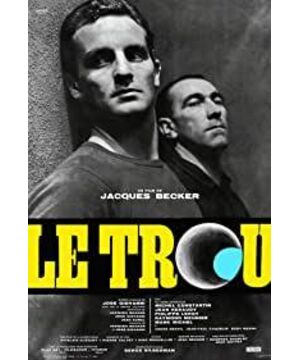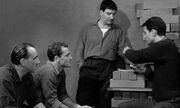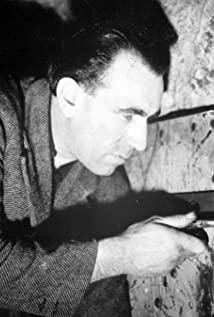This is really amazing, even if "The Shawshank Redemption" is in front of it, you have to worship it three times! After watching the movie, I thought for a long time, is Claude a whistleblower? Why did "Your Excellency" get out of prison? Was this a conspiracy from the start? But all of this seems impossible to have a standard answer. First of all, "Your Excellency" appeared as a repairman from the beginning, saying that it was a little-known story about himself. But in the film, he is a prisoner who has to be sentenced to ten years, and with the crime of escape, how could he use such a young image as a "narrator"? And the detail that really made me think about it was when Claude met his sister-in-law in the reception room and walked to the prison area before him. You know, he came from District 8 to District 11, and the reason for the transfer was the renovation of District 8, but the problem is that District 8, which he went to the wrong way, looked normal, and there was no trace of decoration. Someone lived and was guarded. . It must be the director's intention here, how to interpret it is only left to the audience. The design of this prison is not complicated at all. The prison guards in it all seem to be pleasant, and they even respond to the requests of the prisoners. Such a humane law enforcement place can’t help but make people suspicious. When Claude first entered, he brought a gilded lighter. At first, I thought he just wanted to leave a souvenir. Now it seems that he did it deliberately to please the warden. His setting in the movie is a "soft rice man" whose wife is much richer than himself, and he said that he "can't stand the days without money". Among the five people, we only heard Claude's self-report, why he went to prison, he said that his wife wanted to kill him, he grabbed the gun and accidentally injured his wife. But is what he said true? Couldn't it be that he was having an affair with his sister-in-law and was caught by his wife, and she designed it as his wife, and failed to swallow the property? It is not difficult to understand why he turned against the tide in the end. He did not want to live a life of escape. His wife's "withdrawal of the lawsuit" gave him hope of continuing to live a good life. And this "withdrawal" is also very strange. Only the warden tells Claude that his wife withdraws the lawsuit, but this may not be true. When Claude told the cellmates the news, both Manu and Roland questioned, they didn't believe the warden's words, but Claude was like a swaying grass when he was given a little sweetness, his heart was early Swing to the other side. This kind of man, after all, is impossible to change, betrayal, and the villain's nature cannot be changed after all. Those who go to prison are certainly guilty, but from a certain moral level, there is an invisible moral distinction between prisoners and prisoners. There seems to be love and righteousness here, but in fact it is difficult to distinguish between loyal and wicked. Among the five people, the only good person in the true sense, I think it is Gio, who gave up the escape for his mother, but has been helping them dig holes. He is the most direct from beginning to end, and sincerely digs for them The hole was almost crushed to death by cement. There is no soundtrack in the whole movie, and some only have the cumbersome sound effects of chiseling walls, sawing iron, and digging holes. Although it is boring, it always brings the audience into the tense atmosphere of the movie. To be honest, I was substituted. Until the last moment, I guessed that there would be a reversal. I still hope that they can escape from prison successfully. This sense of substitution is awesome! Then, at the end of the film, Gio took a mirror to observe the door. Everything was normal on the left, and the camera turned to the right. The mirror was suddenly filled with prison guards. So, Roland's line at the end of the film: "Poor Claude." One sentence made his whole character clear, poor Claude, even if he said at a certain moment: "For the first time in my life, It's nice to meet you once I feel free." It was sincere, but he couldn't escape the tragic reminder of his weak character. There are 100 Hamlet in the hearts of 100 viewers. I can't fully interpret this movie after watching it, but I only expressed a few points of view from the level of personal understanding. In the 1960s, the new wave of French films flourished, and there were too many experimental works, and this one was no exception. After all, between reality and human nature, it is impossible to use a "hole" to make it clear. "For the first time in my life, I feel free. It's good to meet you." It was sincere, but he couldn't escape the sad reminder of his weak character. There are 100 Hamlet in the hearts of 100 viewers. I can't fully interpret this movie after watching it, but I only expressed a few points of view from the level of personal understanding. In the 1960s, the new wave of French films flourished, and there were too many experimental works, and this one was no exception. After all, between reality and human nature, it is impossible to use a "hole" to make it clear. "For the first time in my life, I feel free. It's good to meet you." It was sincere, but he couldn't escape the sad reminder of his weak character. There are 100 Hamlet in the hearts of 100 viewers. I can't fully interpret this movie after watching it, but I only expressed a few points of view from the level of personal understanding. In the 1960s, the new wave of French films flourished, and there were too many experimental works, and this one was no exception. After all, between reality and human nature, it is impossible to use a "hole" to make it clear. "For the first time in my life, I feel free. It's good to meet you." It was sincere, but he couldn't escape the sad reminder of his weak character. There are 100 Hamlet in the hearts of 100 viewers. I can't fully interpret this movie after watching it, but I only expressed a few points of view from the level of personal understanding. In the 1960s, the new wave of French films flourished, and there were too many experimental works, and this one was no exception. After all, between reality and human nature, it is impossible to use a "hole" to make it clear. "For the first time in my life, I feel free. It's good to meet you." It was sincere, but he couldn't escape the sad reminder of his weak character. There are 100 Hamlet in the hearts of 100 viewers. I can't fully interpret this movie after watching it, but I only expressed a few points of view from the level of personal understanding. In the 1960s, the new wave of French films flourished, and there were too many experimental works, and this one was no exception. After all, between reality and human nature, it is impossible to use a "hole" to make it clear.
View more about Le Trou reviews










